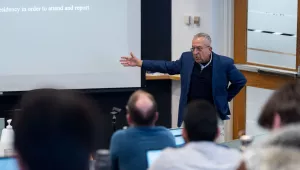One of the most troubling aspects of recent developments in several Arab countries has been growing domestic polarization based on the interplay of ideology, religion and ethnicity. Iraq and Syria are the two most worrying immediate cases, with fighting resulting in hundreds of deaths during the past week. Other Arab countries suffer similar problems, and everywhere in the region societies face growing challenges of how to heal themselves in the aftermath of years of tension, clashes or killing.
Is reconciliation a feasible option for the Arab world that now seems to be moving in the direction of greater domestic intolerance and warfare? We do not know, and only time will tell. The track record of intra-Arab reconciliation has not been very impressive in recent decades, in countries like Lebanon, Jordan, Yemen, Bahrain, Sudan and others.
The issue is on my mind because I have had the good fortune to be reminded of the importance of these powerful forces during a visit to the city of Birmingham, Alabama. Here and in much of the deep south, racial hatred among many white Americans left black Americans living in a state of abuse, humiliation and dehumanization. The civil rights movement that culminated in the early 1960s brought an end to officially sanctioned discrimination by color. Racist views by some individuals persisted, however, and full harmony has not been reached in many southern cities and towns.
I have had the good fortune to be able to visit Birmingham three times in the past three years, and this week I am here participating in a three-day event that seeks to capture the lessons of the role of young people in the Birmingham movement for civil rights. Thousands of young black children marched peacefully for their rights 50 years ago this month, and were jailed in the thousands. As the city these days commemorates the events of 1963 that helped end segregation and achieve equal voting and other rights for all Americans, I have been reminded of the core values and principles of the non-violent protests and civil disobedience campaigns that characterized the civil rights movement, and led to its ultimate success.
In particular, I have come to learn that post-conflict reconciliation is as difficult and as important as the work needed to end a conflict situation in the first place. I was made aware of that recently upon reading the news of the death of a certain Mr. Elwin Wilson, of Rock Hill, South Carolina, a racist who ironically would ultimately stand out as an icon of what the civil rights movement was, and is, all about.
He was one of many white southerners who beat up the Freedom Riders, white and black young men who integrated bus services and bus stations throughout the south in the spring of 1961, often subjecting themselves to vicious beatings. Among the Freedom Riders he once assaulted were Albert Bigelow, a white man, and John Lewis, a black man, who were in a whites-only waiting room at the Greyhound bus station. Lewis later became a prominent civil rights activist and U.S. Democratic Congressman from Georgia.
Elwin Wilson said he had an awakening after Barack Obama was elected president, and telephoned a local newspaper in 2009 to admit that he had beaten Freedom Riders and other activists, and apologized for his deeds. When he learned that Lewis had become a U.S. Congressman, he traveled to Washington, D.C. to meet him and apologize in person, and ask forgiveness. Lewis quickly expressed his forgiveness, and the two men made several media appearances after that to promote social reconciliation and forgiveness.
Lewis later said in an interview that Wilson's was the first apology he had ever received for the violence committed against him during the civil rights movement; he added that he did not hesitate for a moment to accept it. Upon learning of Wilson's death earlier this year, Lewis said that accepting the apology and expressing forgiveness, "is in keeping with the philosophy of non-violence. That's what the movement was always about, to have the capacity to forgive and move toward reconciliation."
The sheer human courage and drama of both Wilson's apology and Lewis' forgiveness are a timely reminder of the underlying goals of the civil rights movement and any other quest for social justice: not just to achieve equal individual rights for all, but to heal past grievances and wounds, and therefore to be able to push society forward to a condition of well-being, stability, and dignity for all citizens. This is just one of the many lessons that we in the Arab world can learn from the American civil rights movement, which was deeply marked by its leadership’s insistence on remaining non-violent, and on confronting hate with love, so that forgiveness and reconciliation could one day step forward and claim their place in the hearts of men and women.
Rami G. Khouri is Editor-at-large of The Daily Star, and Director of the Issam Fares Institute for Public Policy and International Affairs at the American University of Beirut, in Beirut, Lebanon. You can follow him @ramikhouri.
Khouri, Rami. “The Test to Come: Forgiveness and Reconciliation.” Agence Global, April 27, 2013





